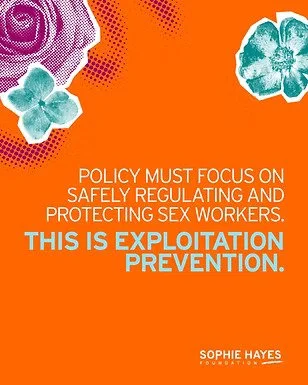We Have Laws to Prevent Sexual Exploitation – So Why Aren’t They Working?
We have laws intended to prevent sexual exploitation – so why aren’t they working?
Firstly, let’s look at why the majority of workers are entering the sex industry: poverty. The UK sex work industry is growing because of larger issues, such as the cost-of-living crisis. Rather than sex work being chosen willingly as a profession, people are turning to this trade as their last resort for survival. According to a survey from Decrim Now, 76% of respondents claimed to work in the sex industry because of financial need.
Next, we need to consider how one navigates sex work safely (if possible). The laws around sex work are complex, confusing, and near impossible to navigate. Whilst sex work itself is legal in the UK, policy prohibits almost every related activity:
Sex workers must be independent workers, meaning working together or organising is prohibited. Any sex workers who create a team, a work rota, consensually hire or fire workers, or rent a property for the use of work can be convicted. Sex workers are permitted to have a housekeeper or maid to offer support, but past prosecutions have shown that the presence of housekeepers and maids is often used to claim the residence as a brothel, by assuming that the maid is also a sex worker.
Due to policy insisting that sex workers work alone, many might be inclined to carry something for protection, such as pepper spray; but the carrying of “offensive weapons” is also criminalised.
Policies make contacting clients legally nearly impossible, as the advertisement of sexual services is criminalised. Because of this, this form of work is disguised with vocabulary such as “escort” or “masseuse”.
Even if a sex worker follows all the stated rules and works alone from their residence, they can still be arrested for keeping a “disorderly house”, which is defined as keeping an open, unchaste house of bad repute. Anything that one can claim attacks “public decency” can be used to convict a sex worker of keeping a disorderly house.
The real-life effects of following these policies essentially force sex workers to work alone, without help and support, massively increasing the risk of danger. Because of this and the risk of arrest when engaging with the legal system, sex work is driven underground. The excess of red tape and grey areas has sex workers wary of registering as independent workers, obtaining permits, and paying taxes, as the law expects them to do – as any interaction with the law, legal or not, is seen as a risk.
If entering this already poorly regulated industry due to poverty, individuals are already at risk of exploitation due to desperation. Expensive fines from laws being bent to criminalise workers place them in a poverty cycle. The added risk of criminalisation will prevent them from seeking proper help and care. Isolated and without support, sex workers often find themselves being entrapped or coerced into forced labour. Whilst many laws focus on preventing this, such as the criminalisation of brothels and pimping, the vague and sporadic nature in which policies are interpreted and enforced contributes to sex workers purposefully avoiding the legal framework to avoid their own arrest. As stated by Freedom United, “This contradictory system doesn’t protect people; it exposes them”.
We hope to see policies in which the protection of human life is prioritised, such as the recent ban on strangulation and abuse in pornography. Although this is a big step in the fight to end violence against women, it can’t be counted as a true win until it is clear how this will be enforced. The Criminal Justice and Immigration Act 2008 already criminalised the possession of extreme porn, under which strangulation and abuse would fall, and this had sadly not been effectively enforced. The sex industry needs to see protective action accompanying words.
If we are to prioritise the safety and protection of individuals, policy must focus on safely
regulating sex work so that workers do not feel the need to hide from local authorities. When one can’t turn to the police for protection, they are at risk of manipulation and coercion from exploiters to whom they may have no choice but to turn.
Sources
Online porn showing choking to be made illegal, government says - BBC News
SEX_WORKERS_&_THE_LAW_2017.pdf
Know Your Rights - A Guide for Sex Workers - English Collective of Prostitutes
Prostitution and Exploitation of Prostitution | The Crown Prosecution Service
Decrim Now Survey Report: Sex Workers Navigating Gendered Poverty – DECRIM NOW


